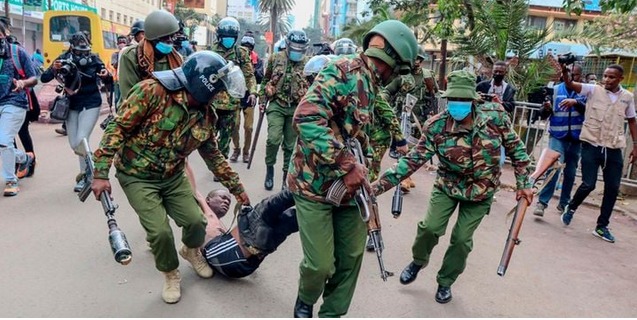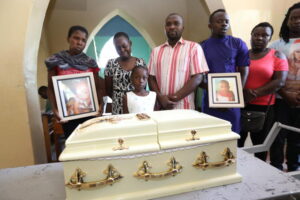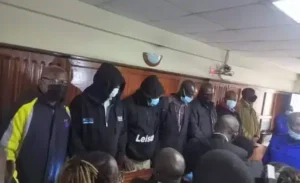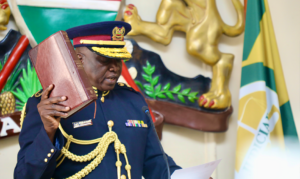Justice for Baby Pendo Marks a Step Toward ICC-Style Accountability in Kenya
Baby Pendo’s Case has Become a Litmus Test for Kenya’s Commitment to Police Reforms

Nairobi, Oct 3 – A High Court in Kenya has issued an arrest warrant for senior police officer Mohammed Baa, one of the commanders implicated in the 2017 killing of six-month-old Samantha Pendo in Kisumu’s Nyalenda slums. This decision came after Baa failed to appear in court for his plea-taking, prompting Lady Justice Lilian Mutende to instruct the new Inspector General of Police, Douglas Kanja, to ensure Baa’s immediate arrest.
The warrant marks a critical moment in the long-standing fight for justice for Baby Pendo, a symbol of police brutality following the 2017 contested General Election. Alongside Baa, 11 other police officers were summoned to face charges for their roles in the violent suppression of post-election protests. These officers include Titus Yoma, Cyprine Robe, Josphat Sensira, Mohammed Ali Guyo, Titus Mutune, John Chengo, Linah Kogey, Benjamin Koima, Benjamin Lorema, Volker Edambo, and James Rono.
The officers are being charged under the International Crimes Act 2008 (ICA), which integrates crimes recognized under the Rome Statute—establishing the International Criminal Court (ICC)—into domestic law. This legal framework allows for the prosecution of serious offenses such as genocide, war crimes, and crimes against humanity within Kenya’s judicial system. It’s a groundbreaking legal move that seeks to hold them accountable based on the principle of superior responsibility—a rare prosecution method in Kenya’s history.

The Director of Public Prosecutions (DPP), led by Vincent Monda, emphasized that this is the first time the State is charging officers under the ICA. The act focuses on widespread or systematic violations of human rights, often perpetrated by state actors. Monda stressed that Baa’s absence had delayed the proceedings, causing frustration among victims’ families and legal representatives. While the victims’ counsel urged the court to proceed without Baa, Justice Mutende reiterated that the DPP must lead the prosecution and ensure a fair trial. The plea date was rescheduled to November 25, with Baa expected to be in court by then.
This high-profile case has gained widespread attention for its potential to reshape police accountability in Kenya. Civil society groups have praised the decision to charge senior officers, calling for speedy justice for Baby Pendo and other victims of post-election violence. Baby Pendo’s death became a chilling symbol of state violence during a brutal crackdown on opposition strongholds after the disputed 2017 election.
The ICA’s invocation in this case sets a major precedent, particularly with its focus on command responsibility. Holding senior officers accountable for their juniors’ actions signals a shift in the legal dimension of police accountability. Human rights advocates see this as a potential turning point in Kenya’s justice system, addressing the deep-rooted culture of impunity within the police force.
“The ruling by Kimondo underscores the potential for the ICA to serve as a powerful tool for accountability in Kenya. Historically, the country has struggled to hold police accountable in situations involving widespread protests, political upheaval, or large-scale deployments of officers,” stated Demas Kiprono, Deputy Executive Director of ICJ Kenya. He noted that this lack of accountability has fostered a culture in which officers often feel emboldened to act with impunity, believing they will be shielded by their superiors.

The ODPP’s involvement followed an inquest into Baby Pendo’s death, where the trial magistrate found that the commanders who led operations in Kisumu on August 11, 2017, bore responsibility for the violent consequences of their orders. According to the ICA, a commander can be found liable if they fail to control their subordinates or prevent criminal acts, and this principle is now being applied to senior officers like Baa and his colleagues.
Meanwhile, the delayed plea-taking of the 12 officers has drawn criticism from 21 civil society organizations under the Police Reforms Working Group-Kenya. They expressed disappointment in a joint statement, arguing that delays prolong the victims’ suffering and hinder justice. These organizations view the case as crucial for establishing police accountability in Kenya, especially in addressing both police brutality and gender-based violence. They urged the DPP and Judiciary to act swiftly, warning that continued delays undermine public confidence in the justice system.
“This case is pivotal in establishing police accountability,” the groups said in a statement, emphasizing that Baby Pendo’s case could set a precedent for addressing police brutality and gender-based violence in Kenya.
The baby Pendo’s case has become a litmus test for Kenya’s commitment to police reforms. Though there has been some progress in this area since the 2007-2008 post-election violence, police brutality during elections remains a serious concern.
The involvement of the ICC after the 2007-2008 crisis underscored the gravity of election-related violence in Kenya, leading to charges against prominent political figures. While the cases against President William Ruto and former President Uhuru Kenyatta were eventually dropped, domestic accountability for state violence continues to be a challenge. The case against the officers, pursued under the ICA, is being seen as a bold and necessary step in addressing this issue and holding both lower-ranking officers and their commanders accountable.

Human rights groups believe that a timely and just conclusion to this case could have far-reaching implications for police reforms in Kenya. It would create a deterrent against future human rights violations and reinforce the need for accountability at all levels of the police force. By prosecuting commanders under the ICA, Kenya would align itself with international justice standards and the principles enshrined in its Constitution, the group said in a statement.
“The successful prosecution of these officers would send a powerful message that state violence and human rights abuses will not go unpunished,” they said. However, delays and legal challenges continue to demonstrate the struggle for justice. As the plea date nears, the pressure is on for the new Inspector General Kanja to bring Baa to justice, while families and civil society closely watch, hopeful for a resolution that could set a new standard for police accountability.
“Restoring the discipline and dignity of the police service will require bold leadership. The incoming Inspector General of Police, Douglas Kanja, must confront the ongoing culture of public violence, secret squads, and defiance of court orders if he is to regain public trust,” Amnesty International Kenya stated on September 23 following another case of police brutality against a university student.